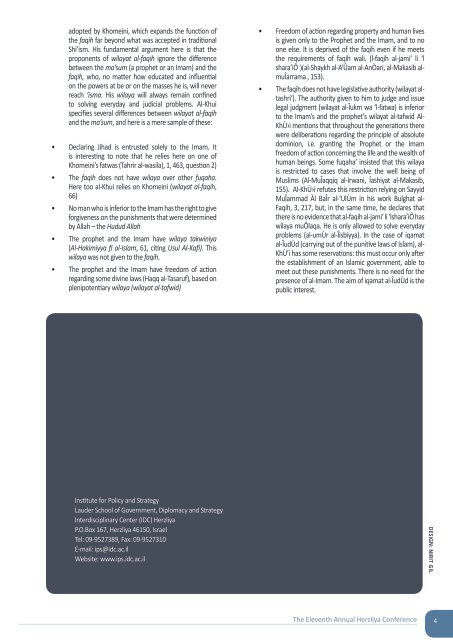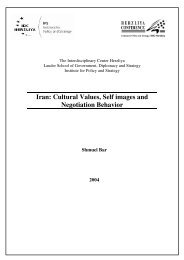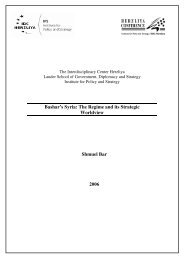The Leadership Paradigm of Ayatollah Sistani
The Leadership Paradigm of Ayatollah Sistani
The Leadership Paradigm of Ayatollah Sistani
You also want an ePaper? Increase the reach of your titles
YUMPU automatically turns print PDFs into web optimized ePapers that Google loves.
adopted by Khomeini, which expands the function <strong>of</strong>the faqih far beyond what was accepted in traditionalShi’ism. His fundamental argument here is that theproponents <strong>of</strong> wilayat al-faqih ignore the differencebetween the ma’sum (a prophet or an Imam) and thefaqih, who, no matter how educated and influentialon the powers at be or on the masses he is, will neverreach ‘isma. His wilaya will always remain confinedto solving everyday and judicial problems. Al-Khuispecifies several differences between wilayat al-faqihand the ma’sum, and here is a mere sample <strong>of</strong> these:• Declaring Jihad is entrusted solely to the Imam. Itis interesting to note that he relies here on one <strong>of</strong>Khomeini’s fatwas (Tahrir al-wasila), 1, 463, question 2)• <strong>The</strong> faqih does not have wilaya over other fuqaha.Here too al-Khui relies on Khomeini (wilayat al-faqih,66)• No man who is inferior to the Imam has the right to giveforgiveness on the punishments that were determinedby Allah – the Hudud Allah• <strong>The</strong> prophet and the Imam have wilaya takwiniya(Al-Hakimiyya fi al-Islam, 61, citing Usul Al-Kafi). Thiswilaya was not given to the faqih.• <strong>The</strong> prophet and the Imam have freedom <strong>of</strong> actionregarding some divine laws (Haqq al-Tasaruf), based onplenipotentiary wilaya (wilayat al-tafwid)• Freedom <strong>of</strong> action regarding property and human livesis given only to the Prophet and the Imam, and to noone else. It is deprived <strong>of</strong> the faqih even if he meetsthe requirements <strong>of</strong> faqih wali. (l-faqih al-jami‘ li ‘lshara’iÔ )(al-Shaykh al-A‘Ûam al-AnÒari, al-Makasib almuÎarrama, 153).• <strong>The</strong> faqih does not have legislative authority (wilayat altashri‘).<strong>The</strong> authority given to him to judge and issuelegal judgment (wilayat al-Îukm wa ‘l-fatwa) is inferiorto the Imam’s and the prophet’s wilayat al-tafwid Al-KhÙ›i mentions that throughout the generations therewere deliberations regarding the principle <strong>of</strong> absolutedominion, i.e. granting the Prophet or the Imamfreedom <strong>of</strong> action concerning the life and the wealth <strong>of</strong>human beings. Some fuqaha’ insisted that this wilayais restricted to cases that involve the well being <strong>of</strong>Muslims (Al-MuÎaqqiq al-Irwani, Íashiyat al-Makasib,155). Al-KhÙ›i refutes this restriction relying on SayyidMuÎammad Àl BaÎr al-‘UlÙm in his work Bulghat al-Faqih, 3, 217, but, in the same time, he declares thatthere is no evidence that al-faqih al-jami‘ li ‘lshara’iÔ haswilaya muÔlaqa. He is only allowed to solve everydayproblems (al-umÙr al-Îisbiyya). In the case <strong>of</strong> iqamatal-ÎudÙd (carrying out <strong>of</strong> the punitive laws <strong>of</strong> Islam), al-KhÙ’i has some reservations: this must occur only afterthe establishment <strong>of</strong> an Islamic government, able tomeet out these punishments. <strong>The</strong>re is no need for thepresence <strong>of</strong> al-Imam. <strong>The</strong> aim <strong>of</strong> iqamat al-ÎudÙd is thepublic interest.Institute for Policy and StrategyLauder School <strong>of</strong> Government, Diplomacy and StrategyInterdisciplinary Center (IDC) HerzliyaP.O.Box 167, Herzliya 46150, IsraelTel: 09-9527389, Fax: 09-9527310E-mail: ips@idc.ac.ilWebsite: www.ips.idc.ac.ilDesign: nirit gil<strong>The</strong> Eleventh Annual Herzliya Conference4
















